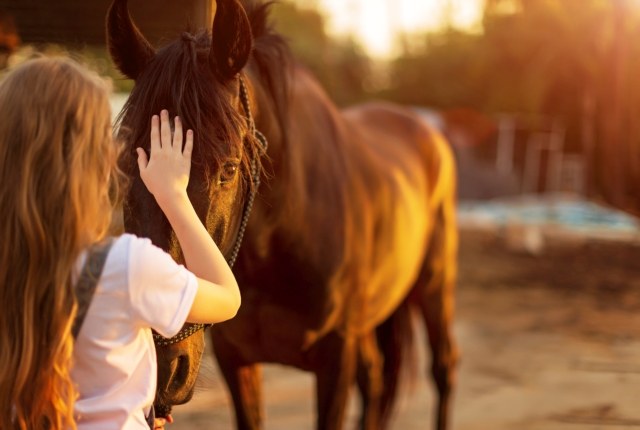Try letting 10 children living in urban areas freely interact with horses in an educational farm for 15 days. The result? It improves the health of their gut microbiome, increases microbial diversity and new anti-inflammatory probiotic components emerge. This was shown by a research study published in the journal One Health and led by scholars from the University of Bologna in the context of the European project CIRCLES.
‘This study demonstrates the importance of interacting with natural ecosystems for our health, especially for a beneficial impact on our gut microbiota’, explains Marco Candela, professor at the Department of Pharmacy and Biotechnology of the University of Bologna, who coordinated the study. ‘The results show that trough interaction with complex natural systems, including farm animals in a rural environment, children’s microbiota regains diversity, with an increase in bacteria that promote health and produce metabolites’.
The gut microbiome – the ecosystem made up of trillions of microorganisms inhabiting our intestine – plays a fundamental role for our health. However, we now know that microbiomes of people living in urban areas show less diversity in microbial populations than the ones of people living in rural areas. This phenomenon, known as ‘microbiome modernisation’, is associated with an increase in allergies, asthma, obesity, metabolic syndrome, type 2 diabetes and other inflammatory diseases. In children living in cities especially, ‘microbiome modernisation’ could be responsible for an increase in allergic diseases.
While looking for solutions to this problem, researchers decided to experiment with an approach called ‘gut microbiome rewilding’, which aims to restoring microbiome characteristics that are typical of rural populations through the interaction with natural environments.
Therefore, researchers involved 10 children aged between 9 and 14 years old living in urban areas of the Bologna region for a ‘biodiversity intervention’. The intervention took place in an educational farm. For 15 days, during a summer camp, the children interacted with the farm’s horses for about 10 hours a day, petting them and playing with them.
‘After the intervention, we observed a significant increase in the children’s gut microbiome diversity and an enhanced production of butyrate - a short-chain fatty acid possessing anti-inflammatory properties’, says Daniel Scicchitano, researcher from the University of Bologna and first author of the study. ‘The changes observed include the increase of beneficial bacteria known for their role in promoting gut health and the bioconversion of plant-based polyphenols into anti-inflammatory metabolites. At the same time, no evidence of virulent or toxic-producing strain transmission was observed’.
The interactions with horses at the educational farm led to an enrichment in the microbiome of the involved children, increasing its beneficial bacteria diversity. These results suggest the effectiveness of ‘rewilding’ actions.
‘Currently, a number of studies are being carried out to confirm these results on a larger scale’, adds Simone Rampelli, researcher at the University of Bologna and among the authors of the study. ‘To do that, we will systematically explore different contexts of interaction with natural ecosystems, in collaboration with regional associations and institutions’.
In fact, the mechanisms enabling this microbiome exchange between different species is still to be explained. However, the researchers’ gaze is now set on a larger horizon, considering interactions between human and nature on its whole.
‘The idea is to demonstrate the importance of interacting with natural ecosystems for our health, in line with the One Health’s framework’, affirms Professor Candela. ‘This way, we will be able to promote integrated health including environment, animals and man, starting from the preservation and restoration of natural ecosystems’.
The study - published on the journal One Health under the title ‘A 15-day pilot biodiversity intervention with horses in a farm system leads to gut microbiome rewilding in 10 urban Italian children’ - was born from an international collaboration between the University of Bologna (counting on the participation of Marco Candela, Silvia Turroni, Simone Rampelli, Federica D’Amico, Nicolò Cinti, Lucia Foresto, Giorgia Palladino and Daniel Scicchitano from the Department of Pharmacy and Biotechnologies, together with Rosalba Vitagliano and Jessica Fiori from the Department of Chemistry ‘Giacomo Ciamician’) and the University of Luxembourg (counting on the participation of Cédric Christian Laczny, Rashi Halder and Paul Wilmes from the System Ecology Group).

